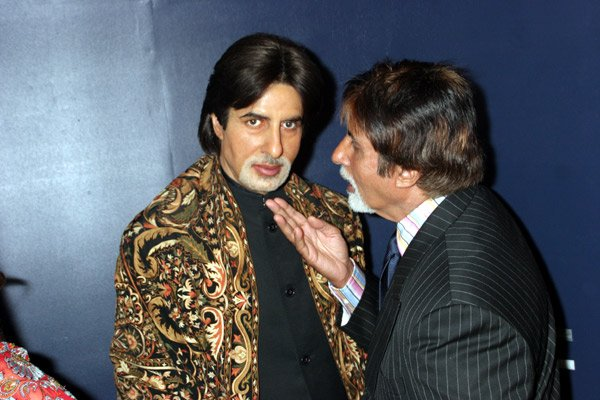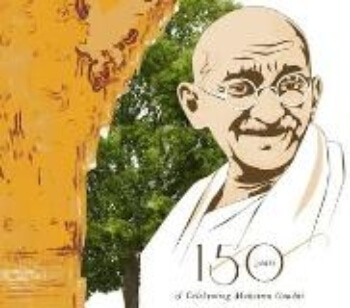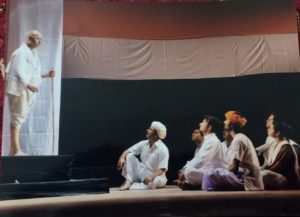


On 20th January 2008, a Mufti from Dehradun mosque issued a fatwa against Salman Khan for getting a wax statue of himself installed at Madame Tussauds. It is one of the main London tourist attractions where wax statues of the famous and the rich of the world are installed. So far Amitabh Bachchan, Aishwarya Rai and Shah Rukh Khan are the only other Indians who have been given this recognition.
Not only is this a harassment of an Indian citizen who has done nothing wrong as regards this matter (actually the installation of Salman Khan’s statue at Madame Tussauds reflects the growing recognition of the Indian cinema at the international level), it is a challenge to the State of India. The phenomenon of the Red Mosque is not confined to Islamabad or Pakistan only, there are many Red Mosques in India as well.
Before that, the farce that has been played in the theatre called the state of West Bengal in relation to Taslima Nasreen lays bare the fact that India has lost its soul and identity. The provincial government run by a communist party – that claims to follow Marx, who said “religion is the opium of the people” – caves in to Muslim obscurantism and communalism, and expels a progressive, feminist and secular Bengali writer from Kolkata.
To top it all, on 19th January 2008 the State Minorities Commission of Maharashtra sent a letter to the Central Government asking for the refusal of a visa to Taslima Nasreen and Booker Prize winning author Salman Rushdie as “they have hurt the feelings of the Muslim community.” Calling the writers “anti-social elements”, the Chairman of the Commission, Mohammed Naseem Siddiqui, wrote: “We do not want them to stay in India and create law and order problems.”
Mr Siddiqui also said that action should be taken against painter MF Hussain for painting Hindu Gods and Goddesses in the nude.
The violent protests against Taslima Nasreen in Kolkata were organised by a Muslim group called the All India Minority Forum, and have been spearheaded by a political party based in Hyderabad, the MIM. Its leader, Asaduddin Owaisi, has been visiting various television studios and saying that Taslima Nasreen should not be allowed to stay in India because she is not an Indian citizen, but a Bangladeshi citizen.
Now, one does need to remember that Pakistan was demanded by the likes of Mr Owaisi (the MIM even fought against the State of Hyderabad joining India). There are many people living as Indian citizens now who supported the demand for Pakistan. On the other hand, there were people – some of them Muslims – on the other side of the border who felt Indian and were opposed to the creation of Pakistan. While most of the Hindus came to India, some Hindus did not, and the Muslims obviously could not. It did not mean that every Muslim living in the territory forming Pakistan was supportive of the new State. But they had no choice. And the statehood of Pakistan, and thereby Pakistani and then Bangladeshi citizenship, was imposed on them and the remaining Hindus there. Otherwise, those people in Pakistan and Bangladesh have always remained Indian. Through my business I have met quite a few Muslims from Pakistan who have said they call themselves Indian and they believe the Partition was wrong. At the BBC, I received letters from Pakistan written in Hindi under Muslim names. They may not have Indian passports and they may not be living in the Republic of India, but India is their spiritual home and they are Indians in their hearts. Taslima Nasreen, out of tune with the Mullahs who want to establish an Islamic State in Bangladesh, is one of them. As we all know, in Pakistan and Bangladesh, Hindus have never been given equal citizenship rights. The establishments in those countries look at them as agents of India. After the demolition of the so-called Babri Masjid in India, the attacks on the Hindus in Bangladesh (and Pakistan) by Muslim mobs were in fact (spiritually) attacks on India. Rather than being a silent spectator of the atrocities committed on the Hindus by fanatic Muslim mobs in Bangladesh, Taslima Nasreen recorded those atrocities in her book ‘Lajja’, and exposed the Bangladesh government who claimed that all minorities are safe in their borders. Whether Indian or not, Taslima Nasreen has done a great service to Indians and India. And India should be grateful to this lady, and it is incumbent on India to give her every possible support – not just a visa and citizenship.
Mr Owaisi might have got an Indian passport, but his intellectual and political sympathies are not with India – they are with the Islamic fundamentalists of Bangladesh (and other countries). He wants Taslima Nasreen to be expelled to Bangladesh so that his soul-mates dominating there can devour her and kill her in the name of Islam, which he finds a trifle difficult to do in mainland India.
The question is why India is in such a situation that it’s finding it hard to protect one of its friends, let alone honour her. The answer lies in the Indian leaders’ wrong response to the Partition. India has committed a fundamental mistake in deciding its own character after the bifurcation of its land.
Right from Gandhi and Nehru to Buddhadev Bhattacharya, Indian political leaders have never been able to understand the Muslim psyche in general and deal with it properly. It was not just Iqbal and Jinnah who wanted a separate state, Muslims all over the country supported the demand for Pakistan with near unanimity. In March 1946 elections, the Muslim League received 86.6% of Muslim votes and won all the 30 seats reserved for Muslims in the Central Assembly (Sumit Sarkar, Modern India: 1885-1947, MacMillan, 1984) on a policy of creating an independent state of Pakistan, with an implied threat of secession if this was not granted. And yet, the Indian leaders were thinking that they may be able to win over the Muslims and stop the division of the country. While Jinnah was stated to be declaring,“We shall have India divided or we shall have India destroyed” (Margaret Bourke-White, Halfway to Freedom: A Report on the New India. Simon and Schuster, New York, 1949) and the armed Muslim mobs were definitely observing Direct Action Day (16th August 1946) by attacking the Hindu communities in Kolkata, the Indian National Congress was thinking that the partition of the country may be avoided. Even after the state of Pakistan coming into existence and being recognised and propped up by the international imperial powers, Gandhi was hoping that he may be able to persuade Jinnah to dismantle the statehood of Pakistan! What a naïve thing to think!
Demoralised with the success of the Muslim League in turning the brightest hour of India – when it achieved independence after centuries of colonisation – into its darkest hour, the Indian leaders were confused and confounded. Seeing India bleed in front of their eyes, they were overwhelmed. And then they were being led by “great” Gandhi who went on threatening the other Indian leaders with hunger strike till death if his irrational and illogical ideas were not accepted. Gandhi went on telling the Hindus and Sikhs in the newly created Pakistan to stay there, and, of course, telling the Muslims in India not to go to Pakistan. With such a call, Gandhi was denying the coming into existence of the State of Pakistan. Did Gandhi expect his call to go down well with the supporters of the Pakistan Movement who “struggled” for decades and made “sacrifices” for the creation of Pakistan – an exclusive State for Muslims! They were breathing a sigh of relief that at last their struggle has fructified and were rejoicing the moment! They could not bear the thought of non-Muslims still living in their land! Any infidel living in Pakistan – the land of the pure – was a self-contradiction in terms! No wonder, in the pursuit of their dream, they reacted with even more violence. Because of the unrealistic behaviour of the Indian leaders at the time, Pakistanis even today accuse Indians of not accepting the separate existence of Pakistan. So, had the Indian leaders accepted the reality of the Partition and adopted a rational approach towards it, there might not have been that much bloodshed. The migration of populations could have been controlled and civilised (as much as possible under the circumstances). Arrangements should have been made to get Hindus, Sikhs and Christians out of Pakistan. Of course, no violence against prospective Pakistani citizens should have been allowed, but all those who supported the creation of Pakistan should have been respectfully escorted out of India.
But the Indian National Congress was living in a state of denial. The Indian leaders were out of their depth and did not know what to do.
There was a person called Chaudhari Khaliquzzaman. He was one of the prominent leaders of the All India Muslim League, spearheading the Pakistan Movement. On 23rd March 1940, at its Lahoresession, under the chairmanship of Jinnah, the Muslim League adopted a resolution, known as the Pakistan Resolution. The Resolution read as follows:
“No constitutional plan would be workable or acceptable to the Muslims unless geographical contiguous units are demarcated into regions which should be so constituted with such territorial readjustments as may be necessary. That the areas in which the Muslims are numerically in a majority as in the North-Western and Eastern zones of India should be grouped to constitute independent states in which the constituent units shall be autonomous and sovereign … That adequate, effective and mandatory safeguards shall be specifically provided in the constitution for minorities in the units and in the regions for the protection of their religious, cultural, economic, political, administrative and other rights of the minorities, with their consultation. Arrangements thus should be made for the security of Muslims where they were in a minority.”
This resolution was moved in by A. K. Fazlul Huq, the then Chief Minister of Bengal, and was seconded by Chaudhari Khaliquzzaman. In 1941 it became part of the Muslim League’s constitution. Throughout the period of the Pakistan Movement, Chaudhari Khaliquzzaman remained one of the prominent lieutenants of Jinnah.
However, after the creation of Pakistan, Chaudhari Khaliquzzaman was sitting in the Constituent Assembly of India! And, he even took the oath of allegiance to India! Yet, no one asked Chaudhari Khaliquzzaman what he was doing in the Constituent Assembly of India, after believing all his life that “No constitutional plan would be workable or acceptable to the Muslims… (except Pakistan)” (Pakistan Resolution – as quoted above).
Now, the Constituent Assembly of India believed very strongly that the separate electorates devised by the British rulers laid the foundation of the Partition. Yet, within two weeks of the creation of Pakistan, on 27th August 1947, during the discussion on minorities’ rights, Chaudhari Khaliquzzaman, accompanied by another of his colleagues from the Muslim League, was again demanding separate electorate for Muslims! Sardar Patel, who was presiding the session, said:
“Well, when Pakistan was conceded, at least it was assumed that there would be one nation in the rest of India – the 80 per cent India – and there would be no attempt to talk of two nations here also. …I have no intention to speak on this, but when the Mover of this amendment (demanding the separate electorate for Muslims) talked such a long time and it was supported by the Leader (Chaudhari Khaliquzzaman), then I felt that there is something wrong again still is this land…”
Yes, there was still something wrong in the remaining India. Despite Sardar Patel, and the rest of the Assembly members, appealing to the Muslim League members to withdraw the amendment, and pass the constitutional provisions relating to minorities unanimously in a show of unity, Chaudhari Khaliquzzaman and his colleague did not budge to accept the provisions drafted and adopted unanimously by the Minority Rights committee. Pleading for separate electorate for the Muslims, Chaudhari Khaliquzzaman had said that there was no need for suspicion towards Muslims. Of course, there was no room left for suspicions. Given the character of the Muslim League, Sardar Patel and other Indian leaders should have been certain that the people like Chaudhari Khaliquzzaman were staying in India to see if they could play the politics of Hindu-Muslim divide again. But Sardar Patel and other members of the assembly could not see that.
After failing in his attempt to start the process of Muslim separatism all over again in the remainingIndia, Chaudhari Khaliquzzaman soon left for Pakistan, and Jinnah appointed him the Chief Organizer of the Pakistan Muslim League.
Chaudhari Khaliquzzaman left, but many still stayed to hurt India from Inside! From Shahabuddin to Owaisi, there is a long line of Islamic fundamentalists who want to have a parallel State within the State of India.
Some people believe had India been declared a Hindu State, we would not have had these problems. As argued by this writer in another article in details in a previous issue of India Link, that would have been the biggest blunder India could have committed. It would have been like jumping from the frying pan into the fire. However, the form of secularism India has adopted was also not responsive to the reality and the history. The response to the carving of an Islamic State called Pakistan out of India wasn’t limited to only two options – declaring India a free for all secular state, or becoming a Hindu State. There was a third alternative – India should have been declared a Secular State sans Islam. The realistic, rational and right response to the Muslim League’s “success” was that political Islam should have been outlawed in India as Nazism has been outlawed in Germany since 1945. There should have been constitutional provisions on the lines of Article 24 of the German constitution and Article 9 of the Japanese constitution barring political Islam from the public sphere for ever. Those who tore India apart should have been treated as the enemies of India, and should have been disarmed within the boundary of India the way the Axis powers were disarmed at the conclusion of the Second World War. Like Hitler, those who perpetrated a holocaust on India in pursuit of their Fascist agenda to achieve “the land of the pure” based on racial and ethnic cleansing and caused unprecedented bloodshed in the history of India (and mankind) should have been made to pay for their crimes against humanity. It is right for India to be secular, but it needed to be ensured that ugly Muslim separatism never rears its head again in India. It needed to be made clear – through constitution – that Islamic parties have no right to exist in the State of India. The Muslim League, the MIM, etc. should be outlawed totally and completely. There should be no place for Shahabuddins and Owaisis in the political sphere of India. Religion should be strictly a matter of personal faith for Muslims. Of course, it was India’s duty to protect those who opposed the creation of Pakistan, and treat them equally. But, if anyone was craving for Islamic or Muslim politics, they should be straightaway arrested and deported to Pakistan – as was done in the case of the MIM president and Razakar leader Qasim Rizwi in 1948. Adding ‘AI’ before their names doesn’t make these parties Indian. Their basic philosophy remains as anti-secular, anti-democratic and anti-India as ever. The recent behaviour of the MIM proves that. In a secular and democratic society, Salman Rushdie and Taslima Nasreen have as much right to express themselves as Mr Owaisi. But Islamic politicians will never accept that. Because the Indian leaders did not handle the Partition logically, the enemy is living within.
In fact, it’s not just what happened to India during the Partition. Even otherwise, Islam is incompatible with secularism. The fight between Islam and Secularist forces in different Muslim countries precisely proves this point. The biggest danger the Islamists see is not from Christianity or Hinduism – they are sure one day they would be able to show the light of the true God to these lost souls – but from Secularism. And, they’re not wrong. Secularism based on rational and liberal thinking is the biggest threat to Islam. Vice versa is true in the same way. The biggest threat to secularism is Islam. The secularists in Turkey might have succeeded in nipping the Islamist tendencies in the bud, but many Muslim countries, such as Algeria, have gone through a lot of painful time. That’s why the moderate Pakistani politicians dread Islamists so much!
Secularism and democracy cannot survive if the tendencies that have been inimical to those ideas are allowed to live within their spheres. By allowing Islamic groups and parties to grow in its body, the State of India is facilitating its own destruction. As exemplified in Taslima Nasreen’s case, the enemies of India are demanding the expulsion of an Indian (if not an Indian, definitely a friend of India) from India, by claiming India to be theirs! This is the travesty of secularism! Actually the travesty of the logic of history!
Some people would say what about the Hindu parties? Well, it has to be said at the outset, violence, or threat of violence from any quarter to a piece of art or writing, is unacceptable. So, the activists of Bajrang Dal or VHP indulging in violence should be treated as criminals and nothing else. Had Mr Siddiqui not been a Muslim bigot himself, it was quite plain to see that it is not Salman Rushdie, or Taslima Nasreen or MF Hussain who are creating law and order problems. It is some hooligans who have been rioting in the name of “religious sentiments”. Such people have no place in a civilised society.
Now, coming to the Hindu parties in the main, firstly Hinduism cannot be equated with Islam or Christianity in the context of India. Hinduism is the bond between different parts of India. Orissa and Gujarat, Karnataka and Himachal Pradesh feel as one country and are together in one State because they share the Hindu culture. If there is no Hindu culture, these geographically distant lands and linguistically and racially different people would have nothing in common and the State of India would not exist. The singular factor that is responsible for the existence of India is that of the Hindu culture. So, the Hindu parties in India have to be looked at in the same way as the Christian parties in Europe – somewhat immature and a bit of nuisance. But the Hindu parties do represent the gut feelings of Indians. Their influence is benign and their existence is no danger to India, unlike the Islamic parties that have proved to be anti-India. Secondly, secularism and the so-called Hinduism are perfectly compatible. A person like me who doesn’t believe in God, and has participated in cultural activities that would have been viewed as ‘blasphemous’ in other cultures, is seen by other Hindus as a normal Hindu. It can be said with a high probability that Hinduism is the most secular religion in the world. And it is definite that Hinduism cannot survive without secularism. And, it is because of the secular psyche of Hindus that India is a secular country. How many Muslim-dominated or Christian dominated countries are as secular as India! Even in the UK, the Queen is the Head and Protector of the Christian faith and gives a special message to British citizens on Christmas Day. We cannot imagine even the BJP, which many people call a Hindu party, demanding that the President of India should act as the Protector of Hinduism and should deliver a special message to the people of India on the day of Diwali! Actually, Indian secularism – Sarva Dharma Sambhav (equal respect for all religions) – is a part of Hinduism itself. An attack on secularism would be an attack on Hinduism. So, there cannot be a danger to Indian secularism from the Hindu parties. And lastly, the most important difference is that the Hindu parties did not demand a separate State for the Hindus, nor have they been given a separate State. While Islamic parties demanded a separate State for Muslims, and they have been given a separate State. So, while one has to bear Hindu, Sikh and Christian parties, there is no justification to accept Islamic politics in the residual India. If someone believes in Islamic politics, they are welcome to Pakistan! That territory is reserved for them!
The views expressed by the author are personal.




